Care Certificate Course
Quantity: 1

Duration 10-12 hours
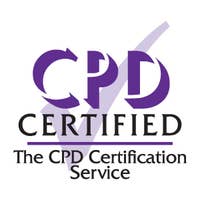

100% online training
Start when you like
Learn on any device (desktop, mobile or tablet)
Instant assessment and result
1 learner per course
Train teams of all sizes
Bulk discounts starting at 10% off 10 courses
Pay by invoice with 30 day payment terms available (5+ courses)
Includes a 10% discount for 10+ courses
Everyone who works in health or social care must know how to keep people safe and meet their needs. The Care Certificate is a nationally agreed set of standards that detail the learning outcomes and requirements that health and social care support workers are expected to be trained in before they can work unsupervised. It is made up of fifteen standards that equip these workers with the skills and knowledge they need to perform their role and deliver suitable care.
The Care Certificate ensures that all health and social care professionals have a similar set of introductory skills, behaviours and knowledge, that they can provide high-quality and compassionate care and support, and that they understand their role in their particular workplace setting.
This online course provides you with the knowledge component needed to complete the Care Certificate. You will learn about the theory and skills that you need to demonstrate when you are being assessed for the Care Certificate, and will learn how to deliver high-quality, person-centred care. Please note: this course does not provide you with the Care Certificate, as this requires a practical assessment to be made in your workplace setting, and by a suitable assessor.
100% online training
Access anywhere
Same day digital Record of Achievement
Full audio voiceover
Assessment retakes at no extra cost
Developed in partnership with healthcare professionals and social care experts
Downloadable and fully editable learning portfolio
Accredited by CPD
Download your Record of Achievement immediately upon completion
Bulk discount for orders of 10+ courses
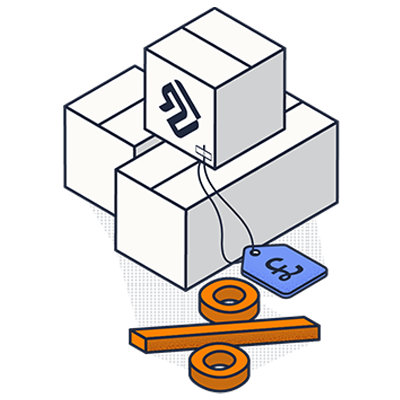
Save on our courses when you buy more training upfront. Lock in a better price now and access the training whenever you need to. You can mix and match any of our courses too and get the discount off your whole order.
10+ courses = 10% off
50+ courses = 20% off
100+ courses = 30% off
500+ courses = 40% off
Within the first module of the course you will be able to download your learning portfolio. This is a fully editable PDF portfolio which you can download and complete on your device, or print off and fill in separately. It is made up of the fifteen standards of the Care Certificate.
The portfolio encourages you to think independently, asks questions to determine your understanding of the course material and allows you to keep all of your notes in one place. It also includes sections where your assessor can write their own comments. We recommend that you complete your portfolio as you progress through your course.
Our course provides you with the knowledge component of the Care Certificate, and you can use your portfolio to show proof of learning and understanding to your assessor. However, the ultimate decision to assess and award the Care Certificate is the responsibility of your manager or employer, not High Speed Training.
By the end of this course, you will:
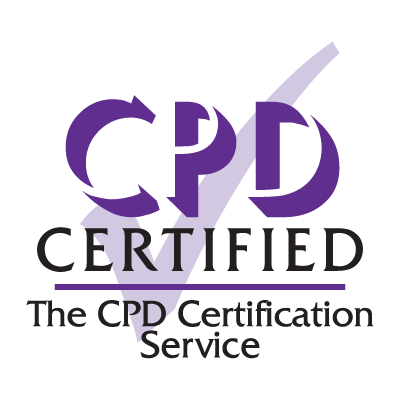
Accredited by CPD
All of our courses are accredited by the CPD Certification Service as conforming to universally accepted Continuing Professional Development (CPD) guidelines.
Our in-house Learning Designers develop all of our courses to give you and your learners the most engaging training possible.
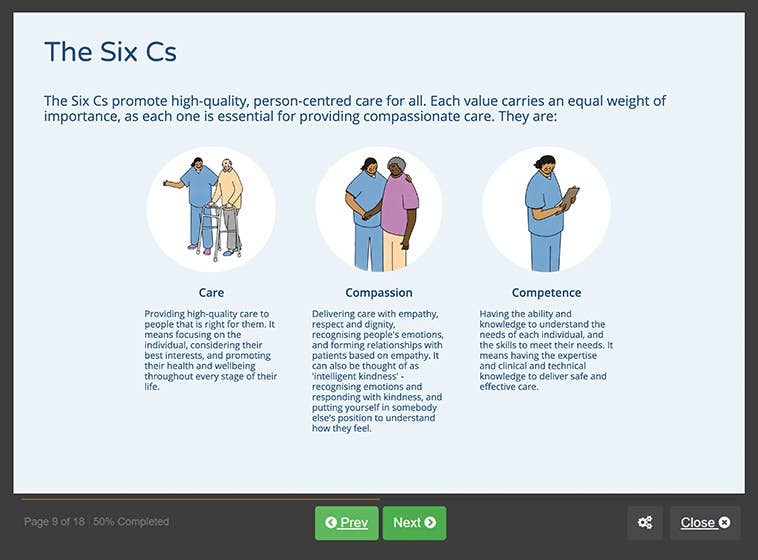
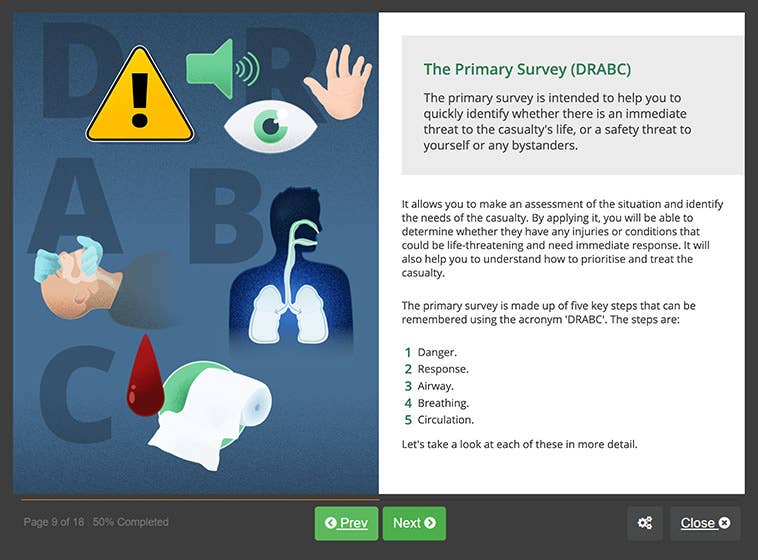
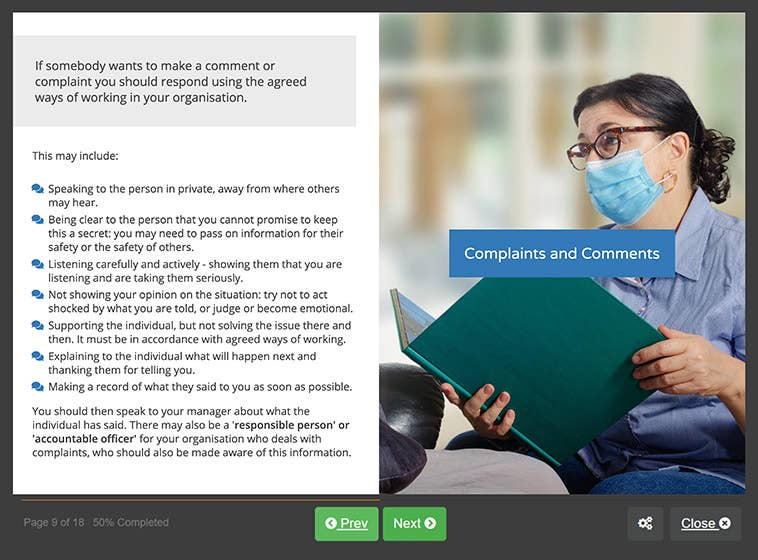
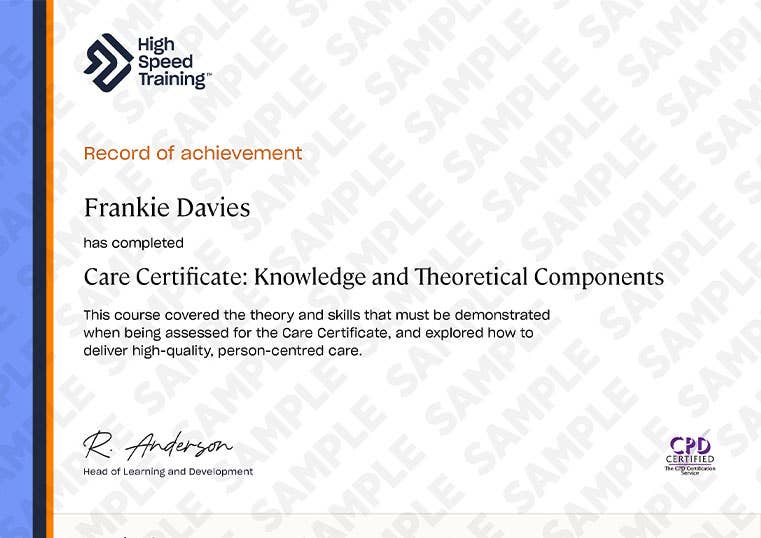




The Care Certificate, the importance of the Care Certificate, background to the Care Certificate, achieving the Care Certificate, the Care Quality Commission (CQC), Key Lines of Enquiry and your learning portfolio.
Understanding your duties and responsibilities, knowing the relevant codes of conduct or practice, how your experiences, attitudes or beliefs may affect the way you work, understanding your rights and responsibilities, accessing information about agreed ways of working, the importance of working in agreed ways, how and when to report concerns (whistleblowing), being honest about errors you make, how working relationships are different to personal relationships, types of working relationships in health and social care, the importance of partnership working, how to increase the success of partnerships, and how to access support.
The importance of continuous professional development, sources of support and the importance of feedback, how to make a personal development plan, required functional skills, ways to develop your skills, knowledge, and understanding, measuring your skills, knowledge, and understanding, and recording personal development progress.
Duty of care, supporting independence and decision making, dilemmas, adverse events, errors, incidents, and near misses, legislation, conflicts and difficult situations, and complaints and comments.
What is equality, what is diversity, the importance of inclusion, discrimination, reducing the likelihood of discrimination, Equality Act 2010, harassment, working in an inclusive way, challenging discrimination, and finding further information, advice, and support.
The six Cs, person-centred values, person-centred working, individual needs, supporting individuals for future wellbeing, minimising discomfort and distress, and maintaining identity and self-esteem.
The different ways people communicate, how communication affects relationships at work, the importance of observing an individual's reactions, establishing communication needs, wishes, and preferences, potential barriers to communication, active listening, the principles and practices of confidentiality, circumstances where confidentiality is overridden, and where to go for further information, advice, and support.
Understanding the principles that underpin privacy and dignity in care, maintaining the privacy and dignity of the individuals in your care, supporting an individual’s right to make choices, supporting individuals in making choices about their care, understanding how to support active participation, and supporting the individual in active participation in their own care.
The importance of nutrition and hydration, eating well, effects of malnutrition and dehydration, promoting good nutrition and hydration, oral health considerations, food safety, contamination, susceptibility, and safe food practices.
What is mental health, mental health conditions, dementia, learning disabilities, the needs of people with mental health conditions, dementia, or learning disabilities, promoting positive health and wellbeing, care delivery adjustments, the importance of early detection, legislation and policies, and mental capacity.
Legislation, defining safeguarding, types of abuse and neglect, safeguarding from abuse and neglect, preventing abuse, complaints or concerns, responding to abuse and neglect (including whistleblowing), safeguarding adults reviews, and information sharing and confidentiality.
Recognising potential abuse, neglect and domestic abuse, honour-based abuse (including FGM), sexual abuse and exploitation, child trafficking and modern slavery, psychological and physical abuse, online abuse, grooming, radicalisation and extremism, bullying, parental ill-health and substance misuse, legislation and rights, and reacting to concerns.
What is basic life support, the primary survey (DRABC), the recovery position for adults and children, and infants, administering hand-only CPR to adults, administering CPR with rescue breaths to adults, administering CPR to children, administering CPR to infants, using defibrillators, choking, basic life support during an infection risk, and confidentiality, recordkeeping, and refresher training.
Health and safety legislation, health and safety responsibilities, accidents and illnesses, training, risk assessment, moving and assisting people and objects, medication and healthcare tasks, hazardous substances, fire safety, security at work, and workplace stress.
What is data protection, why is data protection important, types of data, handling information, key definitions, legislation, agreed ways of working, keeping good records, whistleblowing, and data breaches.
Infection, pathogens, the chain of infection, your responsibilities, hand hygiene, personal protective equipment, safe handling of waste, safe handling of soiled linen, and safe disposal of sharps.
An online knowledge assessment is taken upon completion of the training material. You will be asked 30 multiple choice questions with a pass mark of 80%. The answers are marked automatically so you will instantly know whether you have passed. If you don’t pass don’t worry! You can take the test as many times as you need with no extra charge.
This course is suitable for anybody who is going to be practically observed for the Care Certificate and needs to know what they will be assessed on, what is required of them, and the knowledge they need to fulfil their role.
As made clear by Care Quality Commission (CQC) guidance on Regulation 18(2)(a) of the Health and Social Care Act 2008 (Regulated Activities) Regulations 2014: ‘It is expected that providers that employ healthcare assistants and social care support workers should follow the Care Certificate standards to make sure new staff are supported, skilled and assessed as competent to carry out their roles.’
This means that health and social care professionals are expected to complete the Care Certificate if: they’re new to care, are being inducted as a Health Care Assistant, an Assistant Practitioner or a Care Support Worker - Healthcare Support Worker (HCSW) or Adult Social Care Worker (ASCW), or provide direct care in a residential home, nursing home, hospice or are a home care worker.
This course is not suitable for regulated staff, including doctors, social workers and occupational therapists. They are not required to complete the Care Certificate as they will achieve similar skills and knowledge as part of their professional training.
A step-by-step guide to using our Care Certificate online course.
Try a free demo of our course to sample the course content and training method to ensure it meets your needs.
If you decide to take our course you can easily purchase online or contact our friendly Sales team.
Allocate the training to your learners via our simple to use learning management system (LMS). Learners will then receive an email containing details of how to start their training.
Learners log in to our LMS and begin the online course where they will be asked to download a Learning Portfolio.
This portfolio consolidates theoretical knowledge components of the 15 Care Certificate workbooks into one convenient learning portfolio which can be completed by the learner as they progress through the online course.
Once a learner has passed the Care Certificate online course and completed their learning portfolio they can share the portfolio with their manager/employer who will assess the learner's knowledge and provide appropriate guidance.
Learners will receive a digital Record of Achievement which can be downloaded and kept as recognition of successfully completing our online course.
The decision to assess and award the Care Certificate is the responsibility of managers and/or employers, not High Speed Training.
Our Care Certificate online course provides learners with the knowledge component of the Care Certificate. Managers and/or employers must arrange for a suitable practical assessment to be made in the workplace.
Once the knowledge and practical elements have been successfully completed managers and/or employers can decide to award the Care Certificate.
A free trial that includes the first few modules of our Care Certificate course is available.
The free trial allows you to sample the course content and our training delivery method to ensure it meets your needs. If you decide to take our Care Certificate course there is a charge of £20 +VAT per learner.
The knowledge, learning and understanding gained from the Care Certificate training can be used as recognition of prior learning and can be mapped and linked to Regulated Qualification Framework (RQF) units from:
Find out more here.
Additionally, the learning portfolio within the course is yours to complete and keep and can be used to demonstrate evidence of your prior training, skills and knowledge in future.
Yes. Both the online training course and the Learning Portfolio are compatible with most desktop, tablet and mobile devices with an appropriate PDF Reader installed (like Adobe).
However, we recommend using a desktop/laptop computer for the best experience.
No. You can access our training at any time and you're able to start and stop the course as many times as you like.
Also if you don't successfully pass our online knowledge assessment the first time, you can revisit the training material and retake the online knowledge assessment at no extra cost.
The decision to assess and award the Care Certificate is the responsibility of your manager and/or employer, not High Speed Training.
Our Care Certificate online course provides you with the knowledge component of the Care Certificate. Your manager and/or employer must arrange for a suitable practical assessment to be made in your workplace setting.
Once the knowledge and practical elements have been successfully completed your manager and/or employer can decide to award the Care Certificate.
Yes. The Learning Portfolio is an editable PDF file. To open any PDF file a PDF reader, such as Adobe Acrobat Reader, is needed. Most devices already have a PDF reader installed on them by default.
To check if you can correctly access and use our Learning Portfolio please try this sample learning portfolio.